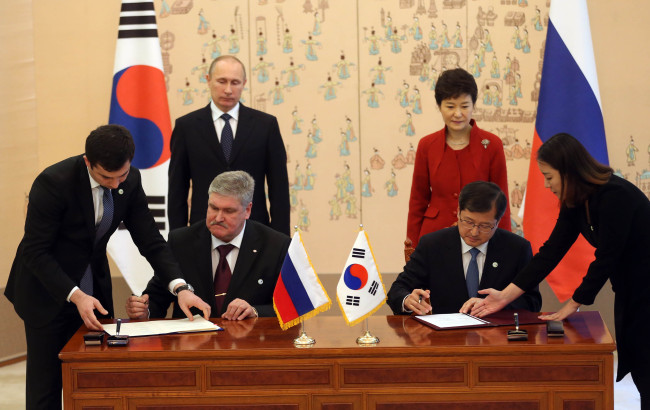[Newsmaker] Rajin-Khasan key project for Seoul, Moscow
By Shin Hyon-heePublished : Nov. 14, 2013 - 20:58

The participation of South Korean firms in the development of a railway between North Korea and Russia and a North Korean port is poised to be the centerpiece of renewed cooperation between Seoul and Moscow.
President Park Geun-hye and Russian President Vladimir Putin agreed to cooperate on the project during their summit Wednesday.
Seoul’s support for the Rajin-Khasan project reflects President Park Geun-hye’s desire to rebuild relations with Moscow. The Russian-led initiative calls for the refurbishment of the North Korean port city of Rajin and a railroad connecting it to the nearby Russian town of Khasan.
The program could pave the way for the Trans-Korean Railway and the Trans-Siberian Railroad reaching Europe. It would also help recreate momentum for Park’s “Eurasia Initiative,” aimed at connecting Eurasian nations by linking roads and railways so as to launch what she called the “Silk Road Express” running from South Korea to Europe via North Korea, Russia and China.
She has pledged to establish an integrated Eurasia power grid and a logistics hub that covers China, Central Asia and Eastern Europe.
South Korean companies including KORAIL, POSCO and Hyundai Merchant Marine are seeking to take over part of the Russian stake in RasonKonTrans, the Pyongyang-Moscow joint venture in charge of the rail and port project.
If the trilateral program proceeds smoothly, the South Korean and Russian firms would be able to use the port as a key export point. It could also help ease tension on the divided peninsula and make way for further cross-border cooperation.
Yet the initiative may end up as another unrealistic joint project. Economic uncertainty, coupled with political risks of working with the unpredictable North as a business partner, poses hurdles. The ambitious program to pipe Russian natural gas to South Korea across the North has made little headway amid inter-Korean tension and low feasibility.
By Shin Hyon-hee (heeshin@heraldcorp.com)
President Park Geun-hye and Russian President Vladimir Putin agreed to cooperate on the project during their summit Wednesday.
Seoul’s support for the Rajin-Khasan project reflects President Park Geun-hye’s desire to rebuild relations with Moscow. The Russian-led initiative calls for the refurbishment of the North Korean port city of Rajin and a railroad connecting it to the nearby Russian town of Khasan.
The program could pave the way for the Trans-Korean Railway and the Trans-Siberian Railroad reaching Europe. It would also help recreate momentum for Park’s “Eurasia Initiative,” aimed at connecting Eurasian nations by linking roads and railways so as to launch what she called the “Silk Road Express” running from South Korea to Europe via North Korea, Russia and China.
She has pledged to establish an integrated Eurasia power grid and a logistics hub that covers China, Central Asia and Eastern Europe.
South Korean companies including KORAIL, POSCO and Hyundai Merchant Marine are seeking to take over part of the Russian stake in RasonKonTrans, the Pyongyang-Moscow joint venture in charge of the rail and port project.
If the trilateral program proceeds smoothly, the South Korean and Russian firms would be able to use the port as a key export point. It could also help ease tension on the divided peninsula and make way for further cross-border cooperation.
Yet the initiative may end up as another unrealistic joint project. Economic uncertainty, coupled with political risks of working with the unpredictable North as a business partner, poses hurdles. The ambitious program to pipe Russian natural gas to South Korea across the North has made little headway amid inter-Korean tension and low feasibility.
By Shin Hyon-hee (heeshin@heraldcorp.com)



![[Exclusive] Korean military set to ban iPhones over 'security' concerns](http://res.heraldm.com/phpwas/restmb_idxmake.php?idx=644&simg=/content/image/2024/04/23/20240423050599_0.jpg&u=20240423183955)

![[Graphic News] 77% of young Koreans still financially dependent](http://res.heraldm.com/phpwas/restmb_idxmake.php?idx=644&simg=/content/image/2024/04/22/20240422050762_0.gif&u=)



![[Pressure points] Leggings in public: Fashion statement or social faux pas?](http://res.heraldm.com/phpwas/restmb_idxmake.php?idx=644&simg=/content/image/2024/04/23/20240423050669_0.jpg&u=)









